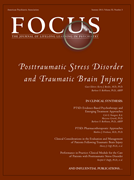Augmenting Cognitive Behaviour Therapy for Post-Traumatic Stress Disorder with Emotion Tolerance Training: A Randomized Controlled Trial
Abstract
Background
Many patients do not adhere to or benefit from cognitive behaviour therapy (CBT) for post-traumatic stress disorder (PTSD). This randomized controlled trial evaluates the extent to which preparing patients with emotion regulation skills prior to CBT enhances treatment outcome.
Method
A total of 70 adult civilian patients with PTSD were randomized to 12 sessions of either supportive counselling followed by CBT (Support/CBT) or emotion regulation training followed by CBT (Skills/CBT).
Results
Skills/CBT resulted in fewer treatment drop-outs, less PTSD and anxiety, and fewer negative appraisals at 6 months follow-up than Support/CBT. Between-condition effect size was moderate for PTSD severity (0.43, 95% confidence interval –0.04 to 0.90). More Skills/CBT (31%) patients achieved high end-state functioning at follow-up than patients in Support/CBT (12%) [χ2(n = 70) = 3.67, p < 0.05].
Conclusions
This evidence suggests that response to CBT may be enhanced in PTSD patients by preparing them with emotion regulation skills. High attrition of participants during the study limits conclusions from this study.
(Reprinted with permission from Psychological Medicine 2013;11:1–8)



